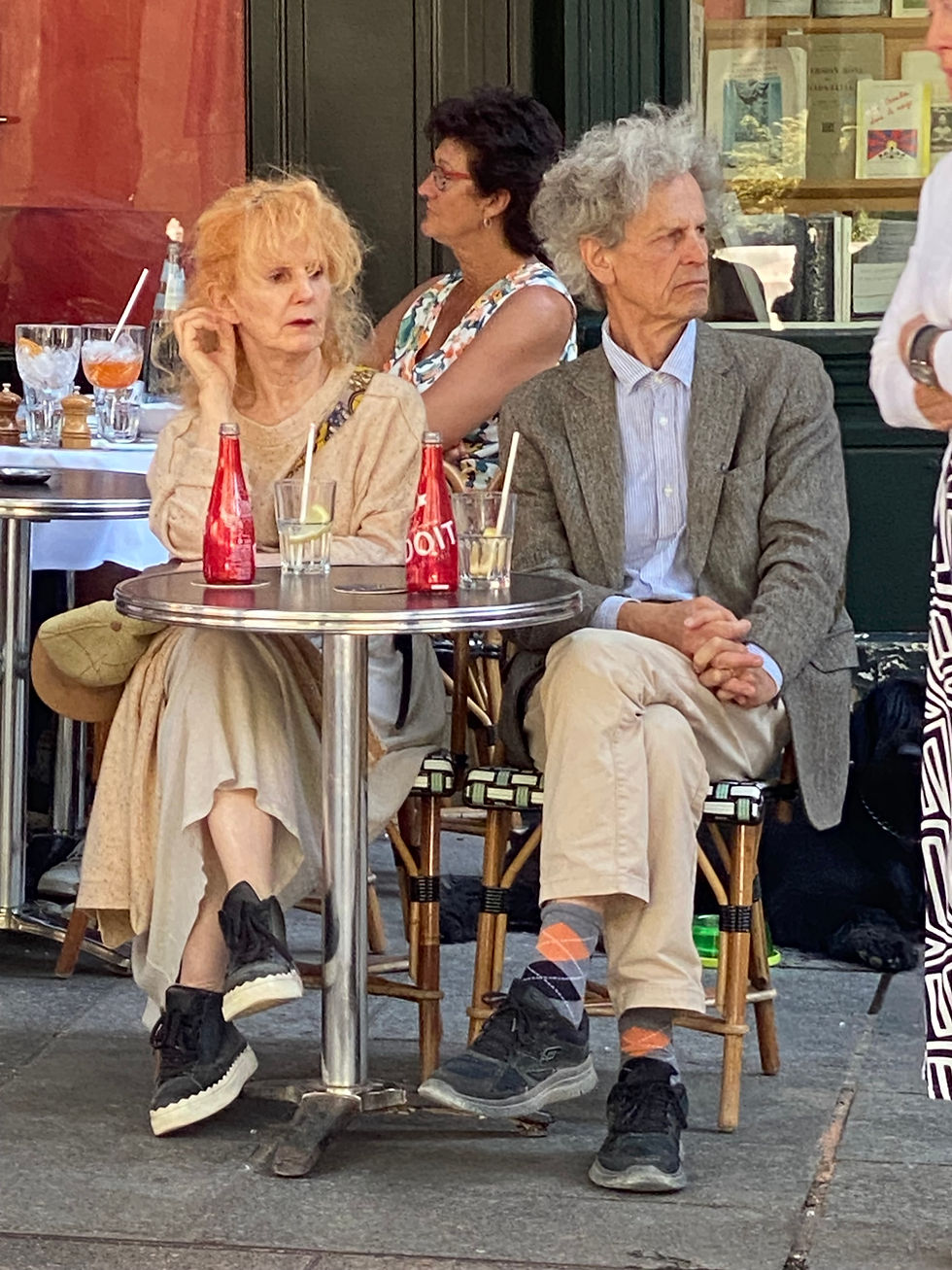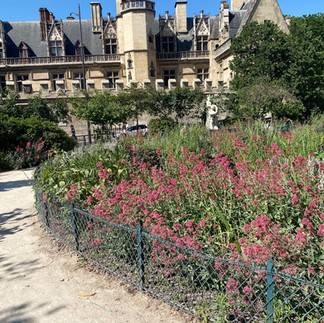Blog 19 - Saying goodbye to Maryse.
- Ashleigh Ogilvie-Lee
- Sep 21, 2023
- 9 min read
By loving Maryse, I fell in love with Paris. She was an old enchantress who stalked her prey with charm, played with them for a while, and then annoyed them. I was paying to stay with her, but I actually became her minder, trying to gently steer her away from people before her charm wore off and they got annoyed with me, as if I had set them up and was her accomplice in this mad game.
When I returned from Sete, Maryse was overjoyed to see me, and she took me for dinner at the Pad Thai over the road, which was her grandchildren's favourite restaurant. (Pierre is 20 and studying in Poland, Anna is 18 and finishing her Bac, and Fanny, her daughter, lives at the foot of the Pyrenees with a man who owns a shop.) I never met or heard from any of them.
Maryse's favorite party trick is to ask waitresses to guess where I am from. When Maya, our waitress, gets the answer right the second time because Maryse has told her the first time, Maryse is amazed and claps.
I tell Maryse I am missing my children and start crying. She reaches across the table, grasps my hand, and starts crying too. I take a selfie of the two of us to send to her grandchildren, and when I go to check if the photo has sent, we can't find her phone. I ring it, and a hard female voice answers, saying she has the phone, which she found on a bench. An hour later, a rough woman called Zara from Casablanca turns up wanting an iced tea and 20 Euros. She then puts her arms around Maryse, shows her a photo of her son, and before she leaves, I take a photo of the two of them. A homeless woman comes up and sponges a cigarette, which Maryse lights for her. Both of these transactions are conducted as if everyone is the best of friends.
One night after school, Maryse takes me for a little tour on bus 96, which passes Notre Dame, the Hotel de Ville, the Louvre, the Tuileries gardens, Place de la Concorde, and the Invalides, in the same distance that we would drive past Farros, Countdown, the Grey Lynn Community Centre, and Moley's house.
We go to the Jardin de Luxembourg, where you don't pronounce the "g." It is very important to Maryse that I see these gardens where Pierre and Anna would ride on the ponies and merry-go-round and where she played tennis as a child. "Did I know she played in competitions for 10 years?" she asks me in one of her stories that go round and round like the merry-go-round.
I am tired, and I sneak onto a bank and look at the beautiful Statue la Fontaine Medici, which was once in the private garden of Marie de Medici. Maryse says the powerful and rich of the pre-revolution days still exist, and though they might share their statues, they couldn't give a jot about the welfare of the people. She says they are no better than the oligarchs, just more refined through centuries of fine breeding.
We sit in a café crowded with tourists, and a Ukrainian family sits in front of us. Maryse hands the little boy her bread and chips, and I wonder what the very young, fit-looking father is doing eating pasta when he should be fighting for our right to wander idly around the gardens and pat little ponies.
Maryse spends all her days working out what I must see and what books to buy me. Education and beauty are her only interests. She finds me beautiful, but not in a gratuitous way, more like one might approve of the lines of a horse. She doesn't really approve of my working life in commerce and says we are from different classes of society, but she still loves me.
I tell her that in the hours before the dawn when sleep taunts, not blesses me, I ask myself, "Where did I go wrong? What wrong did I do?"
She replies, "I have a lot of esteem for what you say of your life, Ashlee, and if you don't have moments like that, you haven't lived!" She tries to comfort me by saying that the morals of the petty bourgeoisie are descended from religion and have nothing to do with literature.
Her bravado belongs to sunlit days, and in those moments, especially at night when her memory haunts her, Maryse suffers deeply from the guilt of leaving her husband, who Fanny loved deeply and who died 12 years ago.
On our taxi rides, Maryse either asks the driver to guess how many children I have, and I always think, "Yikes, is that all I've achieved?" Or she asks them to guess where I am from. No one ever guesses, and one time, to spice things up a bit, I say I am from New Zealand, but I want to be like the Parisiens. The driver says, "No, you do not want to be like the Parisiens because they are very rude." They get in my taxi, and I ask, "How are you?" and they say, "It is not your business to know how we are, just drive!" But, "You, madame," he says to Maryse, "you are a lady."
We arrive at the Canal St Martin and go to a little pasta restaurant, and she is very taken with the waitress and tells her at great length about her 2-month stint as a professor of French in Canada where she didn't learn a word of English. The restaurant is full, but no one shows any impatience as this in France is a sign of bad breeding.
She talks to a poor young man peacefully writing in those funny little squares the French use. I see her eyes alight on him like a cat on a bird, and I am cast aside as I hear her say, "Monsieur, can I ask you what it is that you write?" We are behind a girl with red hair going into the Pompidou Centre, and I see her transfixed. She wafts up to her and touches her hair and tells her it is beautiful.
I go to put our bags in the locker, and when I come back, she is talking to the man behind the desk, and people are attracted to this old lady sprinkling magic all about her. We go for crepes, and there are four Germans at the table beside us, and she decides to practice her German of 60 years ago on them. I can sense their uneasiness, especially the only woman who keeps making faces at me as I stand patiently like the owner of a happily sniffing dog. The women really are much ruder and intolerant than the men. I want to get Maryse away before she is shooed away. She resists when I pull gently on her arm and is angry and keeps asking why I pull her away when she wants to practice her German. Then later, she asks, "Do I talk too much?"
One night, we sit to watch the final of the French Open. "Did I tell you I played tennis for 10 years?" she asks me.
She takes me on a tour of the 5th arrondissement, which is the intellectual part of Paris where she went to the Sorbonne and her father went to the Lycée. She says it is very important that I know this about her and that this is the only part of Paris that matters. A whole corner of the block between the great university and the lycée is dedicated to a shop selling books on philosophy called J. Vrin. Paris really is a city where intellect and culture are revered above all else, and Maryse is an intellectual snob of the very finest. She is an archivist, just like my mother, and my bedroom is full of her boxes of ancient papers, love letters, and overflowing bookcases.
We go to the Latin Quarter, and I ask her why this is called the Latin Quarter. She sidles up to ask a couple of women, and they tell her that in the Middle Ages, all the teaching was done in Latin. There is a large building dedicated to and built in the Middle Ages where Fanny used to study. Fanny, Maryse’s daughter, is a historian, a professor, and a doctor of medieval history or a medievalist. Fanny’s ex-husband was a doctor too, a doctor of petrol. Maryse says that like her own ex-husband, he was not handsome but intelligent, so intelligent. Beauty and intelligence are the recurring themes over and over.
The summer holidays start on July 7th, and it seems all of Paris, except Maryse, will escape out of a city that cannot cope with the soaring temperatures. I go down to her historic cave, deep in the bowels of the earth, with the gay men who share her apartment block and who drink beer with us every night. They get her an air conditioning unit so she will not overheat when everyone has deserted her. Her younger brother Charles is very angry with Maryse and yells at her down the phone. He’s angry she will be alone again this summer and that she has a boarder in the house. He doesn’t offer to take her with him to his summer house.
Maryse was all alone, barely able to move after breaking her knee in the summer of last year. She sat in her small, baking hot 6th floor apartment without anyone coming to see her, watching her plants die. Anna was in North America and Pierre was helping the handicapped in Poland. Fanny was in India, but Maryse says every day she sent photos, and in my mind, I passed my holiday in India with Fanny. Her photos nourished me. I love them, and their happiness made me happy.
I went to the hospital every 15 days. It was hard, but the men who sell petrol helped me. They took my washing over the road. I am not a saint; I couldn’t do much shopping, and I became very thin. I nourished myself in another way with the photos.
I was not alone. I had my radio, my emissions, my photos, and the war in Ukraine. Her radio! It is on from the minute she wakes up, and 100 times a day she asks me if it is alright to have it on.
She will be alone again this summer as Fanny has not invited her to stay in her big house at the foot of the Pyrenees. Maryse grabs my face and kisses it.
In my time with Maryse, her affection was sometimes too much for me to bear. I would say, "Maryse, I have to go to my room to write," and she would sit on the hard yellow couch and wait for me to come out. I couldn’t come out to have a coffee or go to the loo as she was just waiting for me.
One lunchtime, she buys some fresh stuffed pasta shells from the Italian shop next door and tells me the people who started the shop were friends of hers. Then she adds, "Well, when I say friends, I knew them, but he was hardly a professor at the Sorbonne." Her intellectual snobbishness is genuine and unabashed.
In the days leading up to my departure, she tries to give me all her old lipsticks and earrings, saying that giving presents gives her pleasure. She cries, "Why did I want you to post your eyes on my university? Because you are my family. You have taken a fraction of my heart. It is not your fault. You are my present for being 80. Please thank your mother for making you."
My nephew Sam and his wife Ginny come to Paris from Ibiza as their two boys, Teo and Saulie, are traveling back to NZ with me so Damaris (Adie) can be with her grandchildren for 2 months. It is beyond wonderful to see them, and I cry with joy. Maryse comes to dinner with us, and I am glad that they can know her because I love her so, and in the years to come, they will reassure me she really did exist.
On my final night, we have a little party with my gay friends from next door. Nana comes to say goodbye, and the three of us go out for dinner till midnight, as most of Paris will wake at 10, but not me, as the taxi comes at 4 am.
I try to sneak out because I can’t bear to say goodbye to this woman who has stolen my heart. But she is waiting outside my door in her pajamas. She comes to the car and says, "Il ne faut pas dire, Fontaine, je ne boirai pas de ton eau." This means, "You must never say fountain, I won’t drink your water." Meaning, never say we will never meet again.
She presses a tiny little leather book as big as a postage stamp with a tiny pencil into my hand, and she cries. The love that Maryse gave to me was unadulterated. She raised her head from the water into which she is sinking to swim with me one last time in the glory that is Paris.
Enjoy the photo:
Les meilleures amies

Maryse and the homeless woman

Zara from Casablanca "20 Euros please, and a ice tea"

"You do not want to be like the Parisians" - Taxi driver

Making new friends

Jardin de Luxembourg (don't say the G)

Her stories went round and round like the merry-go-round

Medici Fountain

Old man and the tree

What about these two intellectuals in their natural habitat

Bottom right - my bedroom/Maryse's archive
Bottle left "and what is they you are writing can I ask"
"What beautiful red hair you have my dear"

At the Pompidou Centre

The caves

The petrol men who helped Maryse when she had a broken ankle and me being squeezed much too tightly

Maryse and Nana, our final night

The final night with the team at the pub

Punching a durry while she waits

Sam and Ginnis tribe have arrived

"I speak German"






















You bring the people you meet to life. What memorable stories and photos. (I love the intellectuals in their natural habitat!).
oh my gosh this is the most beautiful story - a true observation of life and what..can it mean.. what is left. I am so glad you had this time with Maryse but she must miss you!!